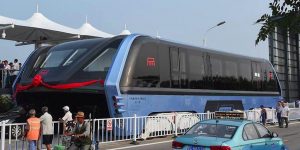Chinese electric bus manufacturers are exploring opportunities to start operations in India and have held initial discussions with the Automotive Component Manufacturers Association (ACMA) and the Society of Manufacturers of Electric Vehicles (SMEV), three people aware of the development told Mint.

According to one of the persons cited above, five Chinese electric bus manufacturers, including well-known ones like BYD Co. Ltd and Changsha Sunda New Energy Vehicles Technology Co. Ltd, have been aggressively exploring options to enter the Indian market.
“Most of these companies see huge potential in India, as the Union government also wants to convert the entire fleet of vehicles plying on Indian roads for public transport to electric by 2030. In China, the traditional battery-run electric vehicles did not get much traction. So most of these companies now see India as one of the markets where they can venture,” the person said on condition of anonymity.
Attempts to contact BYD via Twitter failed to elicit any response.
BYD is already selling some of its electric vehicles in India through Hyderabad-based Gold Stone Group and has recently supplied six electric buses to the Brihanmumbai Municipal Corporation (BMC). BYD has operations in Europe, South America and North America.
Changsha Sunda New Energy was established in 2016 by the Central South University of China.
Besides vehicles, it also manufactures batteries to power electric vehicles. According to its website, it has entered into strategic cooperation with Chinese original equipment manufacturers like China National Automotive, Foton and Zhongtong Bus Co. Ltd. It has a similar arrangement with Wuhu Tianyi—a leading battery manufacturer in China.
“Some of these companies have capacities for manufacturing 10,000 electric buses per annum in China and they also have the lithium-ion battery technology as well. So if they start manufacturing or assembling the vehicles they will bring these technologies along with them and India suppliers can learn from them by forging tie-ups or joint ventures,” said a second person who also requested anonymity.
China is the largest manufacturer of electric vehicles in the world and most of its manufacturers have been trying to venture out to other geographies with governments across developed and developing economies looking to promote electric mobility to curb carbon emissions.
According to the people cited above, most Chinese manufacturers are planning to assemble vehicles locally at the outset. That, however, will be contrary to the Indian government’s Make in India initiative.
“Four to five Chinese companies are trying to enter the Indian market and as they think it has potential in terms of electric buses since the government also intends to shift public transport to electric power. Now the government has to decide because these companies are going to assemble and not manufacture in India and the subsidies on these electric buses are quite substantial. So it would not do justice to the Make in India initiative, said Sohinder Gill, director, corporate affairs, SMEV.
“We feel the challenge is these electric buses will come at a significantly higher price which can be a multiple of at least 4-5 times existing prices. So in a country like India where bus penetration is abysmally low (less than two buses per 1,000 people), introduction of electric buses en masse is still a distant dream. Also, forex requirements will go up significantly which again can be another challenge in a country like India as state governments mostly invest in buses and they are already facing a scarcity of funds,” said Puneet Gupta, associate director, sales forecasting, IHS Markit.
(Source: Livemint)




























